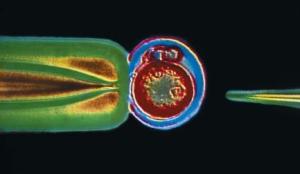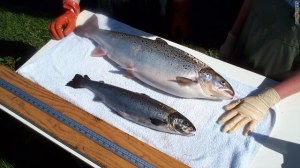
We’ve been reading a lot about the increasing attention that genetically modified foods are getting. Everything from produce, to meat, to seafood are all being genetically engineered for quicker, bigger, longer-lasting ‘products’. This may work well for cost-conscious food producers but, for consumers, there remains many unresolved concerns about the ethical, environmental and health related effects of these foods. Introduced to the market less then two decades ago, there simply has not been enough time to evaluate the true consequences of genetically engineered (GE) foods.
One such food is the Aquavantage transgenic salmon. For months the FDA has been on the verge of approving this new GE fish which, if approved, would be the the first genetically engineered animal sold as food. We could compile an exhaustive list of why this GE food might be bad but, to fully understand the debate, we must first answer the question: “What ARE genetically modified fish anyway?”
To make the AquAdvantage transgenic salmon scientists selected two sequences of DNA – one from a Pacific chinook salmon, the other from an eel-like fish called the ocean pout. The genes are chemically knit together and injected into fertilized Atlantic salmon eggs incorporating them into their genetic makeup.

In a complicated feat of genetic engineering, eggs from those transgenic fish are then isolated and biochemically “tricked” into developing without fertilization, a procedure known as “gynogenesis.” The resulting all-female fish are then treated with a hormone to turn them into males and their sperm is used to fertilize ordinary salmon eggs. These offspring are what is intended for food production.
The reason scientists have gone to all this trouble is that the foreign DNA strands reprogram the salmon’s metabolism, manufacturing extra growth hormones, and keeping the internal hormone factory switched on so that they continue to grow during the winter months. The resulting fish is a salmon that grows into a thirteen pound adult in two years – twice as fast as ordinary farm-raised fish. These fish can also be farmed year-round, and in any climate.

Last Thursday the U.S. House of Representatives passed a law that would effectively bar the FDA from approving GE salmon. This ruling was a result of increasing consumer awareness, and the public’s expressed concern surrounding the safety of GE foods. The matter will soon be addressed in the Senate but for now consumers have made their voices heard. GE products are not welcome in our oceans, in our markets, or on our plates.
Jimmy Wilson, Bauman College Marketing Manager